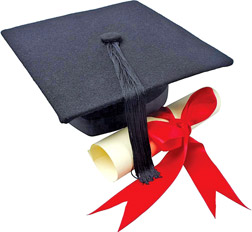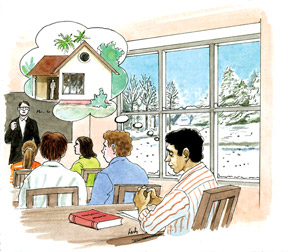|
Flying far, but returning to the family nest:
Home to roots
Graduates with foreign degrees:
Aditha Dissanayake
December 20, 2008. She trudges through ankle deep snow, from the
hospital to her ramshackle apartment. Having just completed 8 hours of
training as part of her degree in medicine at the X University, even
through the sound of the snowstorm raging around her, she keeps hearing
the voice of her professor’s rapid-fire
 admonitions.
A perfectionist in the operating theatre, he makes sure his students
take their profession seriously. “This patient may just be a dummy, but
you are killing her!”. He raps his students. admonitions.
A perfectionist in the operating theatre, he makes sure his students
take their profession seriously. “This patient may just be a dummy, but
you are killing her!”. He raps his students.
The apartment she shares with two others is cold and lonely. She
takes her phone into her hands. “I can’t do this. I want to come home,”
she sobs. The voice at the other end is comforting, yet demanding. “You
can do it. Our family never gives up. We are survivors!” her father
tells her. “Shh...” soothes her mother. “You can’t let us down now.”
Flash forward. December, 2010. Twenty five year old Marshi (not her
real name), is back home with her degree in medicine obtained from the
University of X, China. Now that the Advanced Level exam results are
out, to all her younger brethren, who are worried they will not have the
right Z score to enter a local university, and who are contemplating
enrolling in less expensive universities in other Asian countries, she
has this to say; “prepare yourself for the most vigorous days of your
life.”
Marshi is only one among the thousands of students who enroll in
foreign universities every year. Her story is the story of many others
who are forced to leave the country in their determination to study for
a degree, be it in science, engineering, law or the arts.
Speaking for most foreign graduates who live on shoestring budgets
Marshi describes the harsh weather, the freezing apartment, the empty
pots and pans when she returned home after a grueling day at the
hospital and the nights spent on a few cream crackers to sooth her
grumbling stomach. “Long hours of standing in the hospital, exams every
two weeks, cooking, cleaning, washing, paying bills....I thought I was
growing old prematurely!”.
Strange cultures

To add to these woes most Sri Lankan graduates living in foreign
countries have to adopt themselves to strange cultures. Some
universities have such rigid disciplining, coming to terms with their
laws are as hard as passing the exams. “The university I attended has a
history of being part of the red army and being honoured by Mao Tsetong.
They still run the place with a huge book of rules and regulations!
There were times when I and the other foreign students were exasperated
by their strict disciplining! It felt as though we were in a military
training school rather than in a university!.” Getting used to the low
temperatures is another obstacle most students find hard to scale. On
winter days when the temperature was a freezing -30 degrees Marshi says
she would ask herself “What on earth am I doing here?” And wonder if she
too would die from hypothermia as Jack Dawson does in “The Titanic.”
But survive she did, like the many others before her, and today she
is home to fulfill her dream of following in her parent’s footsteps, by
becoming a doctor. “As a kid I grew up watching my parents who are
doctors, I have lived in hospitals, as a kid, because when they could
not find a baby sitter they took me to work with them. All I ever wanted
in my life was to be like them.”
One wonders if she would have been so ardent about her dream if she
had known in her childhood that for her, studying for a medical degree
here in Sri Lanka would never be possible. As revealed in a Communique
issued by the University Grants Commission, “Admission to universities
is extremely competitive and the mere fact that an applicant has
satisfied the minimum requirements and the pre-requisites is no
guarantee that he/she will be admitted.
In recent years the numbers ranging from 108,000 - 131,000 have
obtained the minimum requirements for admission to universities, but the
actual number admitted has been only about 17,000 - 21,000.” In such a
milieu it is inevitable that ambitious students seek other pastures when
it comes to their higher education. “After two attempts at the A-L exam,
I was not going to give up my goal!” says Marshi. “I have a sister and a
brother, and my parents could afford me only so much! I went to China to
fulfill my dream!”
Dream
A dream that hovers on the brink of turning into a nightmare, once
the foreign graduates return home. Even though throughout the five or
six years they live on foreign pastures they know no other pasture could
be as green as the pastures at home, once they return they begin to have
doubts about the decision to serve their motherland instead of migrating
to a so-called “developed” country like the USA, UK or Canada. Most
graduates with medical degrees lament their colleagues at home treat
them as outcasts because they have degrees from foreign universities.
 “When
we go abroad to get our degrees in medicine we enroll ourselves in
universities which have been approved by the World Heath Organization,
so we are not quacks by any chance!” says Marshi. “When
we go abroad to get our degrees in medicine we enroll ourselves in
universities which have been approved by the World Heath Organization,
so we are not quacks by any chance!” says Marshi.
A graduate with a medical degree from a university in Russia, who is
now working in a local hospital, who wishes to remain anonymous, echoes
the same sentiments. Having returned home after seven years in Russia to
find the Act 16 exams were delayed by one and half years, when she
finally passed the exam after attending tuition classes paying
exorbitant fees, with extreme difficulties (graduates with foreign
degrees are not allowed into local hospitals to examine patients as part
of fulfilling the requirements for the exam) she was posted to
Batticaloa and later to Vavuniya. “We are given step-motherly treatment”
she explains. “When appointments are given to graduates, those with the
local medical degree are on the top of the list and those who have
foreign degrees are at the bottom, so they end up having to serve in
difficult areas as the North and East.”
Is there no solution to help graduates with foreign medical degrees
who return home? Would a government-recognized educational program that
helps them prepare for the “ERPM” exam solve the problem?
Marshi and her senior counterpart with the Russian qualifications
agree. “Even after we start work as qualified doctors our colleagues
treat us as if we have got the plague.” Adds the latter.
“But I survived and will continue to survive because at the end of
the day I know the patients I treat are my own kindred, and that I am
serving my motherland.”
So would you, if your mantra too is “I will survive.” To quote the
Buddha, Cetana ham bikkhawe, kammam vadami” (motive itself is action).
[email protected]
Scaling the ERPM hurdle
“According to Dr N J Nonis, Registrar, Sri Lanka Medical Council, the
Examination for Registration to Practice Medicine in Sri Lanka (ERPM)/ACT
16 conducted by the Sri Lanka Medical Council (SLMC) “is applicable to
all foreign graduates from recognized medical schools and universities.
The list of such schools is available as a booklet and also in the
Council website. The exam has a theory part - Part A and Clinical/Viva
voce part - Part B. A candidate must pass Part A to go for Part B.
Following a court order last year, the same Multiple Choice Question
Papers used for the Final MBBS of local medical schools are used for
Part A.”
“Held in March or April every year, through the ERPM exam a
candidate’s ability to approach medical practice with the appropriate
intellectual skills of enquiry, clinical reasoning, critical thinking
and decision making is assessed.
ERPM also examines if candidates posses sufficient knowledge of the
basic and clinical sciences and have the ability to create a
differential diagnosis and rationalize a treatment plan for common
clinical situations prevalent in Sri Lanka.”
A lawyer’s lot
A twenty-three year old Sri Lankan with a degree from UK who has
returned home and wishes to start practicing here says
“Foreign LLB graduates and UK Solicitors have to do all three years
at law school again, do a practical training course and serve a period
of apprenticeship.
Barristers from England, Scotland and Ireland must do exams in (i)
Civil procedure, Pleadings and Law of Executors and Administrators, (ii)
Law of Property, (iii) Tax Law, (iv) Industrial Law and (v) Commercial
Law 1.
If they have done a pupillage in the UK they do not have to do the
practical training course or apprenticeship but if they haven’t done
pupillage then they must do both.” |



